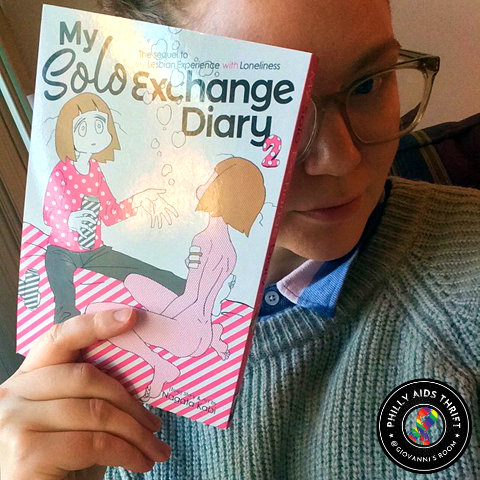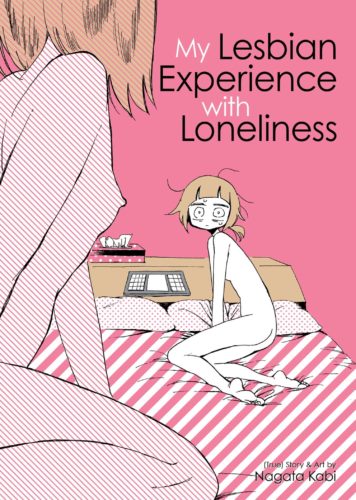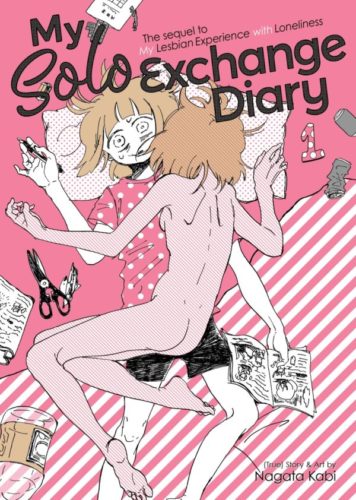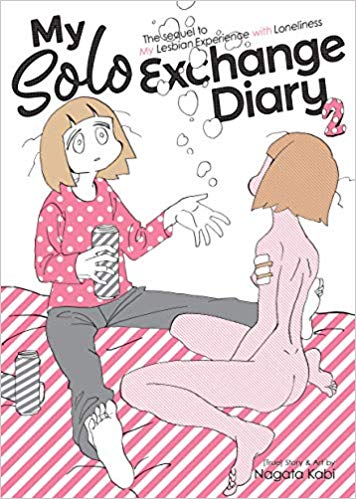
Hey there, folks. My name is Katharine, and I am still kind of shy about putting my face up on the internet; my Instagram is empty, and I don’t even do Twitter. I’m definitely not the type to chronicle my first sexual experience in hiring an escort and put it online for the world to see.
That also means I’m not the award-winning author of international sensation My Lesbian Experience With Loneliness, so, you know. Joke’s on me.
In 2015 Kabi Nagata was twenty-eight years old, chronically depressed, and sexually unexpressed. Feeling stunted in almost all areas of life, but most essentially in her connections with other people, she decided to work toward the concrete goal of having sex with another woman for the first time. This, she rather desperately hoped, would give her an entrée into real adulthood, or at least a better understanding of herself.
It… didn’t quite work out as planned. But it did launch a manga series.
If you’re unfamiliar with manga, or Japanese graphic novels and comics, My Lesbian Experience With Loneliness might be, well, an experience. It’s in the same autobiographical vein of Marjane Satrapi’s Persepolis or Alison Bechdel’s Fun Home, but the art is a more impressionistic than realistic. The simpler character designs allow for a focus on details, like the protagonist’s permanently astray hairs, to inform you of their emotionality. Reality can be drawn with a sense of fluidly for the same effect: a pretty girl’s smile lights the air around her with sparkles, a character’s skin can almost melt with mortification. Even nakedness is drawn more evocatively than explicitly.
Nagata first posted her story for free, online, and it was only after it became a success and a sensation that it was published through more traditional means. This trajectory makes a lot more sense in the context of the story — because sharing her experiences and the reactions she received are a big part of that story — when you see how Nagata uses Twitter and other platforms to navigate a social sphere she otherwise feels hopelessly unequipped to enter. Still, with no lack of hot-take think pieces on how our Facebook feeds are basically fool’s gold, it’s arguable that a certain kind of social media prioritizes the audience — its purpose is to inspire or entertain, not document an authentic experience.
My Lesbian Experience With Loneliness was written with the exact opposite impulse. In fact, Nagata describes how she first decided to write down her story in the first place because she found herself glamorizing her own memories of hiring an escort in retrospect — making it sexier, cooler, more fun, less awkward and aimless. I personally spend way too much time on social media to undermine its value as entertainment. But if you’re one of the growing number of people who have started to feel the disconnect between how life is lived and how life can be edited, polished, and posted for public consumption, Nagata’s series is a perspective-shifting antidote.
After the success of the MLEWL, Nagata decided to continue for as long as possible in this vein of honesty and sharing, and the follow-up was My Solo Exchange Diary. The title is a reference to a Japanese trend among schoolgirls, especially popular in the ‘90s, of a notebook passed back and forth between two friends as they share their daily experiences and thoughts. In her isolation and after her previous experiences, Nagata knows the person she most wants to develop her relationship with is herself: “Dear Nagata Kabi,” she begins each chapter of the Exchange Diary books. “How are you? This is Nagata Kabi.”
So, how’s a deep introspection of everyday life and a recreation of mundane details read? Surprisingly affecting, or at least I found it so. Nagata’s visual representation of her metaphorical and emotional struggles can make even her darkest agonies relatable, even wryly funny. When paired with her thoughtful insights, it creates an unexpectedly gripping narrative out of real-life victories like moving into one’s own place or going on a first date.
And if this were a fictional story, that’s probably where it would end. Instead, Nagata continues — and then concludes — her series with My Solo Exchange Diary, volume two, the English translation being published just last month. (With plenty of brand-new copies now available at Giovanni’s Room!) Although darker elements have always played a part in the series — issues of self-harm, suicidal thoughts, emotional abuse — this is the volume where they really take center stage. Nagata takes a hit from the double isolation of both living on her own and working a very solitary job, even if it is her dream job. She ends up staying in-hospital for a while… and then…
I don’t want to give away too much. The series’ strength lies not in what happens but how it happens, and why, and Nagata’s story in particular is one that begs to be experienced instead of explained. This doesn’t always make for a pleasant read, especially with the potential for culture shock in an American reader when encountering Japan’s approach to mental health. (Gentle scolding: apparently a much more palatable approach than say, medication.) But we’re back to the issue of honesty again. You can level a lot of criticisms at the series: that it’s dark, maybe even dull in spots, or even that such an exhausting documentation of detail doesn’t always amount to an actual story. (I wouldn’t say any of that, for the record, but tastes differ.) However, anyone who’s been through the “two steps forward, one step back” wringer of recovery can’t deny: this is exactly what that looks like.
Say or think what you will about this age of living our lives either surrounded by or participating in the performance of social media — there are plenty of places you can find success stories, or polished images meant to inspire by their glossy perfection. Maybe there’s also room for something a lot messier, and a lot more personal, in order to encourage as much as inspire. Maybe it’s just as important to remember: struggle might not feel like success, but it’s definitely not failure.
Review by Katharine, a volunteer at Philly AIDS Thrift @ Giovanni’s Room.



